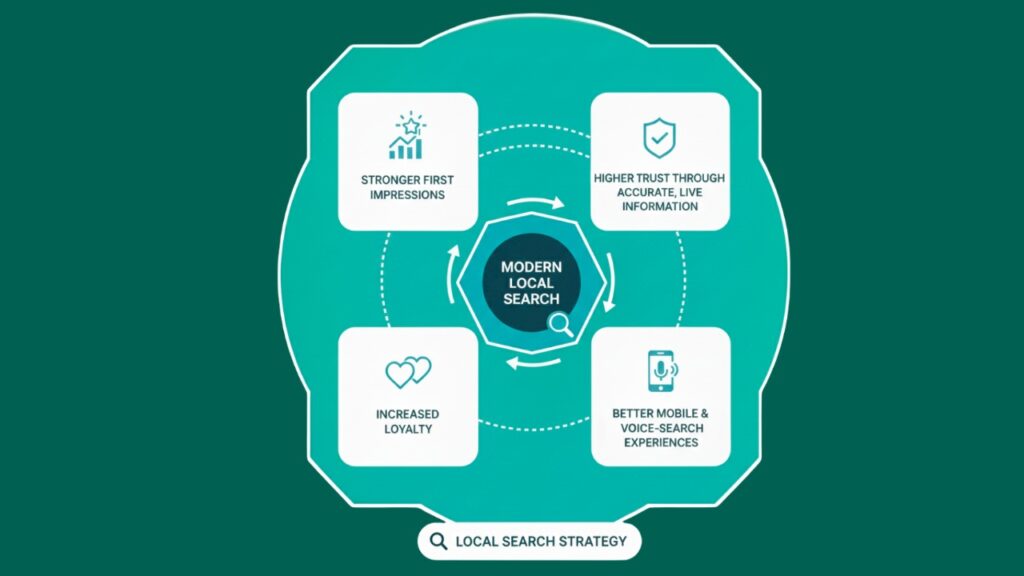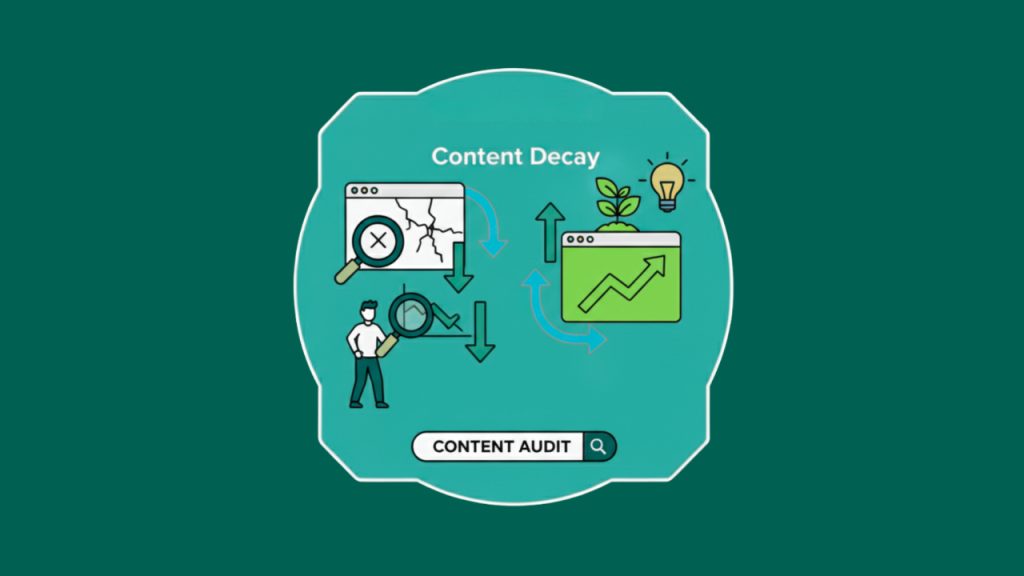Introduction
Running a small business means wearing many hats. You’re the manager, the marketer, the customer service rep, and sometimes even the IT support.
With so much to juggle, SEO (Search Engine Optimisation) might seem like just another thing to add to your never-ending to-do list. But don’t worry. It doesn’t have to be complicated.
A well-structured SEO strategy can help boost your website’s visibility and attract more customers, without needing a massive budget. By focusing on the right tactics, you can drive more organic traffic and ensure your business is easily found online.
To make things easier, we’ve put together some SEO tips for small businesses to help you grow and succeed online.

1. Focus on the Right Keywords
Keywords are the words and phrases people use to search for businesses like yours. Start by thinking about what your customers would type into Google. Use free tools like Google Keyword Planner or Ubersuggest to find relevant keywords.
Following these SEO for small business tips will ensure you target the right audience. Make sure to include them naturally in your website’s content, headings, and meta descriptions.
It’s also important to use a mix of short-tail and long-tail keywords. Short-tail keywords are broad and competitive (e.g., ‘small business SEO’), while long-tail keywords are more specific and easier to rank for (e.g., ‘SEO strategies for small retail businesses’). Using both types in your content can help attract the right audience.
2. Create High Quality Content
Content is key to SEO success. Writing useful content such as blog posts, FAQs, and guides that answer common customer questions is one of the most effective SEO tips for small businesses.
Regularly updating your website with fresh content tells Google that your site is active and valuable to users.
Consistently publishing high-quality content will establish your business as an authority in your industry, making it easier to rank for competitive terms.
When creating content, keep these tips in mind:
- Write for your audience first, not just search engines.
- Structure your content with subheadings.
- Incorporate multimedia like images, infographics, and videos to enhance engagement.
- Include keywords naturally but avoid keyword stuffing.
- Add a clear call-to-action (CTA) to encourage interaction.

3. Optimise For Mobile
More than 62% of global website traffic came from mobile devices in the last quarter of 2024, according to Statista, highlighting just how crucial a mobile-friendly website is.
If your website isn’t mobile-friendly, you could be losing potential customers. That’s why optimising for mobile is one of the essential SEO tips for small businesses.
There are tools like Google Lighthouse that can help you assess your site’s mobile performance. Lighthouse is an open-source, automated tool for improving the quality of web pages. It offers insights into various aspects, including mobile usability.
Alternatively, PageSpeed Insights provides data on your site’s performance on mobile devices and offers suggestions for improvements.
Mobile optimisation is especially important for local SEO, as many users search for nearby businesses on their phones.
4. Improve Site Speed
Slow websites frustrate visitors and can hurt your rankings on Google. To speed up your site:
- Compress images before uploading them.
- Use a caching plugin (if you have a WordPress site).
- Minimise unnecessary plugins and scripts.
- Choose a reliable web hosting provider.
- Enable browser caching and reduce redirects to decrease load time.
Website speed plays a crucial role in SEO for small businesses. A fast-loading site improves user experience, reduces bounce rates, and increases conversions.
In fact, good web design principles such as optimising page speed and user-friendly navigation are essential for SEO success.
You can check out more tips on improving your website’s performance in our guide to web design best practices.

5. Optimise for Local SEO
If you run a local business, local SEO is crucial. Here’s what you need to do:
- Set up and optimise your Google Business Profile.
- Include your business name, address, and phone number (NAP) on your website.
- Encourage satisfied customers to leave reviews on Google and other platforms.
- Use location-based keywords in your content and meta descriptions (e.g., ‘best coffee shop in Birmingham’).
By implementing these SEO strategies for small businesses, you can improve your visibility in local search results, making it easier for nearby customers to find you.
6. Optimise Meta Titles & Descriptions
Meta titles and descriptions are like your website’s first impression. They help search engines understand what your page is about. Here’s some top tips on how to optimise them:
- Include relevant keywords naturally.
- Make them engaging and informative to encourage clicks.
- Use action-oriented language to make them more compelling.
Good meta tags are a small but mighty part of SEO for small businesses. They help to boost your click-through rates (CTR) and improve your rankings in search results.

7. Build Quality Backlinks
Backlinks are links from other websites to yours. They act like votes of confidence, helping your site rank higher in search results. You can earn backlinks by:
- Writing guest posts for other websites.
- Listing your business in online directories.
- Partnering with local bloggers or influencers.
- Creating shareable, high-quality content that other sites will want to link to.
A key part of your strategy should also be focusing on the quality of backlinks over quantity. For more detailed strategies on building the best backlink building strategy, check out our top tips.
Use Internal Linking
Internal links connect different pages of your website. They help Google understand your site structure and keep visitors on your site longer. They’re like signposts that guide users to important content while also improving your SEO.
This is one of the easiest SEO tips for small businesses to improve site navigation. The easier it is for users to find what they need, the more likely they are to stick around!
For example, if you mention a service on your homepage, link it to the dedicated service page. When implementing an internal linking strategy:
- Use descriptive anchor text.
- Link to relevant pages naturally.
- Ensure each page has at least a few internal links to enhance discoverability.

8. Track Your SEO Performance
SEO takes time, so tracking your progress is key to understanding what’s working and what needs improvement. Without regular monitoring, you could be missing opportunities to attract more visitors.
Use Google Analytics to monitor traffic trends, user behaviour, and conversions, while Google Search Console helps you track keyword rankings, indexing issues, and search performance. Together, these tools give you a clear picture of your website’s search performance.
Regularly reviewing these insights is one of the most valuable SEO tips for small businesses, as it helps you fine-tune your strategy based on real dataLook at metrics like organic traffic, bounce rate, and keyword rankings to see where you’re gaining traction and where adjustments are needed.
SEO isn’t a one-time task; it’s an ongoing process. Keep tracking, testing, and refining to stay ahead of the competition.
The Final Word on SEO for Small Businesses
It may seem overwhelming, but by following these simple SEO tips for small businesses, you can start seeing real improvements in your website’s visibility. The key? Stay consistent, keep learning, and be patient. SEO is a marathon, not a sprint!
Put in the effort, and over time, you’ll attract more visitors, climb the search rankings, and turn clicks into customers
Need expert support to boost your SEO? Check out our SEO services and let’s take your business to the next level!

Want some more?
Latest Insights & News

How Modern Local Search Transforms the Customer Experience
The New Role of Local Search in Customer Experience Local search didn’t make a grand entrance. It settled into the middle of our online lives

AI Search Optimisation for E-commerce: 7 Proven Steps to Boost Visibility and Sales
How AI is Changing the E-commerce SEO Game AI search optimization for e-commerce is no longer an idea. It is practice. Search engines now use

Understanding Content Decay: How to Spot and Revive Underperforming Pages
What Is Content Decay and Why Does It Matter for SEO Content decay is the gradual decline in organic traffic and rankings. This happens to












